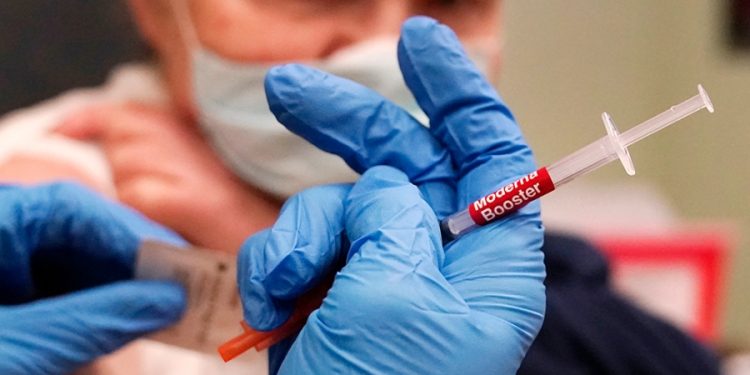NASA has announced plans to crash a spacecraft into an asteroid on purpose. It will be the world’s first planetary defense test against potential threats to Earth from space and we are this much closer to realizing Star Wars.
Today in health care, Moderna asked the FDA to authorize its updated booster shot, but challenges remain in convincing people to get yet another COVID-19 vaccine.
Welcome to Overnight Health Care, where we’re following the latest moves on policy and news affecting your health. For The Hill, we’re Peter Sullivan, Nathaniel Weixel and Joseph Choi. Someone forward you this newsletter? Subscribe here.
Moderna seeks approval for updated COVID booster
Moderna on Tuesday said it submitted a request for the Food and Drug Administration (FDA) to authorize an updated version of its COVID-19 vaccine targeting the latest omicron subvariants.
The application comes ahead of a fall booster shot campaign. Assuming the FDA signs off, the company said its shots will be ready to ship in September.
The application, per instructions previously given by the FDA, is for a “bivalent” vaccine that targets the BA.4 and BA.5 subvariants of omicron currently circulating, as well as the original form of the virus.
The Centers for Disease Control and Prevention (CDC) said it anticipates the bivalent vaccines will only be authorized as a single dose in people who have completed a primary vaccination series. It also won’t matter how many prior booster doses a person has received, so long as they’ve had their initial series.
Trial gambit: Like Pfizer, Moderna said it does not have clinical trial data for the vaccine. Instead, the request is based on data from a booster targeting an earlier version of omicron, as well as preclinical data from mice.
Human clinical trials are currently underway, so the results won’t be available for the FDA to consider as it decides.
Big challenge: But it remains unclear how many people will get the new boosters, despite the potential for a surge of COVID-19 over the fall and winter, given that uptake for the first booster shot has been lagging.
Read more here.
Pfizer vax 73 percent effective in children under 5
Pfizer’s COVID-19 vaccine was 73.2 percent effective against the disease in children under 5, the company said Tuesday.
The company touted the data as reinforcing the importance of the vaccine, which was authorized in June, after months of waiting for a vaccine for the youngest children.
The effectiveness is for after three shots of the vaccine. The Pfizer vaccine’s authorization was delayed earlier this year to allow time to study a third shot, with the idea that two shots were not enough.
Updated vaccine in the works: Pfizer said Tuesday that it is working on a vaccine for children under 12 specifically targeting BA.5, matching its approach for adults
12 and over.
“Building on the strong safety and immunogenicity data that led to FDA authorization of our COVID-19 vaccine for children 6 months through 4 years, we are pleased to share confirmatory evidence that a full course of vaccination helps protect against symptomatic disease, particularly during a time when the Omicron BA.2 strain was predominant,” Pfizer CEO Albert Bourla said.
How many will take it? Getting parents to vaccinate their young children is an ongoing challenge. Only about 5 percent of children under 5 have been vaccinated so far, ABC News reported last week.
Read more here.
LIFE EXPECTANCY DROPS BY ALMOST 2 YEARS
Overall life expectancy in the United States dropped by 1.8 years from 2019 to 2020, new data shows.
The decline affected all 50 states and Washington, D.C., according to a new National Vital Statistics report, and ranged from as little as 0.2 years in some states to as many as 3 years in others.
The cause: The National Center for Health Statistics and its Division of Vital Statistics attributed the dips to the COVID-19 pandemic and an increase in drug overdose deaths.
The drop is the largest year-to-year change in more than 75 years, the Centers for Disease Control and Prevention (CDC) said last year.
New York state experienced the biggest decrease, dropping 3 years, and D.C. was a close runner-up at 2.7 years.
Twelve other states saw declines of 2 years or more, including the southern border states of Texas, Arizona and New Mexico, as well as Louisiana, Mississippi, Illinois, Indiana, New Jersey, Alabama, Kentucky, Michigan and South Carolina.
Hawaii saw a decline of just 0.2 years. Oregon, Washington, Maine, Vermont and New Hampshire also saw decreases of less than a year.
The CDC recorded 528,891 more deaths in 2020 than the year prior. COVID-19 was the noted cause in 350,831 deaths, or 10.4 percent of the 2020 total, according to the report.
Read more here.
MONKEYPOX HAS REACHED ALL 50 STATES
The monkeypox virus has reached all 50 states.
According to Centers for Disease Control and Prevention (CDC) data, Wyoming reported a single case of the virus on Monday, becoming the final state in the country to do so.
In a news release, the Wyoming Department of Health (WDH) said the lone virus case is from a male resident in Laramie County, adding that state public health representatives have followed up with the infected individual to see if other residents had direct contact with him.
“Because monkeypox spreads through close, intimate contact we do not believe the risk for the virus is now a higher concern for the local community or for most people in Wyoming,” said Alexia Harrist, a state health officer and state epidemiologist. “Monkeypox does not spread easily like familiar viruses such as influenza or COVID-19.”
As of Monday, there are 15,433 reported cases of monkeypox in the U.S, with New York leading the way with nearly 3,000 reported cases, followed by California, Florida, Texas and Georgia, CDC data showed.
Read more here.
Fauci on GOP probe threats: ‘Doesn’t faze me’
Chief White House medical adviser Anthony Fauci said on Tuesday that his recently announced decision to step down from his government positions was not at all affected by threats of investigations from congressional Republicans.
Future party plans: Several GOP lawmakers have vowed to launch investigations into Fauci over his actions throughout the COVID-19 pandemic if they win back control of Congress in the midterm elections.
Fauci’s announced plans of stepping down later this year did not deter lawmakers from planning potential future inquiries, with several Republican leaders vowing to still pursue investigations into the top infectious diseases expert even when he is no longer working for the government.
CNN chief White House correspondent Kaitlan Collins asked Fauci Tuesday how much those threats of investigations played a role in his decision to end his decades-long tenure in government.
“None at all, Kaitlan. Really none at all, not even a slight amount,” Fauci said. “I have nothing to hide and I could defend everything I’ve done. So that doesn’t faze me or bother me. My decisions of stepping down go back well over a year.”
Collins asked Fauci if he would agree to sit for hearings and appear before Congress after he steps down if Republicans were to make such a request.
Fauci said he would “certainly” consider the request.
“So sure, I’d be happy to cooperate so long as we make it something that is a dignified oversight, which it should be, and not just bringing up ridiculous things and attacking my character. That’s not oversight,” he said.
Read more here.
WHAT WE’RE READING
The $18,000 Breast Biopsy: When Having Insurance Costs You a Bundle (Kaiser Health News)
U.S. plan to stretch monkeypox vaccine supply already hitting hurdles (Stat News)
Some bars are playing a major role in fighting monkeypox in the LGBTQ community (NPR)
STATE BY STATE
Mysterious illness killing dogs in northern Michigan has state, feds investigating (Detroit Free Press)
Democratic lawmakers call on health department to stabilize Montana State Hospital with federal accreditation (Montana Free Press)
Mississippi Delta loses its only neonatal intensive care unit (Mississippi Today)
OP-EDS IN THE HILL
The viruses are winning: There’s still time to fight back
The CDC is broken and apologies can’t fix it
That’s it for today, thanks for reading. Check out The Hill’s Health Care page for the latest news and coverage. See you tomorrow.
VIEW FULL VERSION HERE















